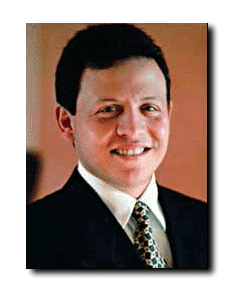

アブドッラー・ビン・アル・フセイン国王
Abdullah II bin Al Hussein
King of the Hashemite Kingdom of Jordan
生年月日:1962年1月30日 GMT 3:30
出生地:アンマン
【学 歴】
1980〜81年 英王立陸軍士官学校 1983年〜 英 オックスフォード大学聴講生(国際政治) 1987〜88年 米 ジョージタウン大学大学院修士課程(国際関係論)
1990年 英 指揮幕僚学校
【職 歴】
1962〜65年 皇太子 1981年 ジョルダン陸軍少尉任官 1984年 陸軍中尉 1985〜86年 陸軍大尉、第91師団戦車大隊長
1986〜87年 空軍対戦車ヘリコプター隊戦術教官 1989年 陸軍少佐、第17師団戦車大隊長 1992年 第40旅団装甲大隊長 1993年 陸軍大佐 1994年6月 陸軍准将
1994年7月 ジョルダン特殊部隊司令官 1998年 陸軍少将 1999年1月 皇太子に叙任 1999年2月 国王に即位
【言 語】アラビア語、英語
【宗 教】イスラム教徒
【訪日歴】4回(1999年12月には国賓で訪日)
【主要叙勲】大勲位菊花大綬章及び頚飾(1999年。国賓訪日の際の相互儀礼叙勲)
【家 族】ラーニア王妃との間に一男二女。
【趣 味】スキューバ・ダイビング、カーレース等
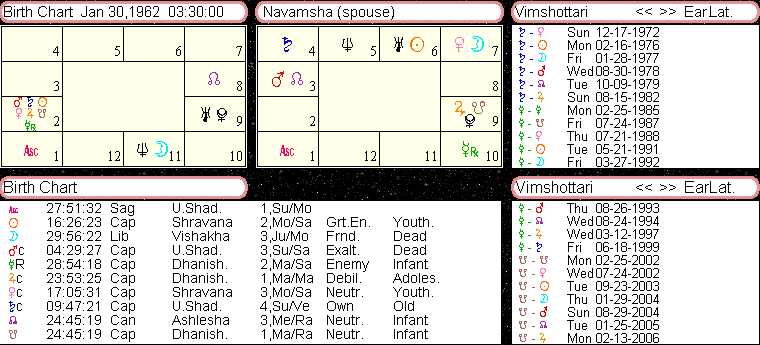
チャートの持ち主は父親のフセイン国王亡き後、1999年2月7日にヨルダンハシミテ王国の国王として即位した。
射手座ラグナで、ラグナはヴァルゴッタマで、2室惑星集中であり、巨大な富の持ち主であることが分かる。
彼は一国の国王であり、広大な国土の中に何でも所有している。皇太子として、生まれた時からヨルダンを相続する運命にあった。
但し、ラグナロードの木星は2室で減衰している。
彼は国土(資源)と富に囲まれて、モラル(道徳心)を失いがちで国民に理想や包容力を示すことが難しく気まぐれなリーダーであるかもしれない。
然し、木星は高揚する5室支配の火星とコンジャンクトしており、ニーチャバンガラージャヨーガを形成している。高揚する火星と減衰する木星で、
彼は非常に多忙で、単に相続して安泰であるというよりも山羊座惑星集中であることから、ハードに活動しなければならない運命にある。2室の惑星群は
8室にアスペクトしており、やはり、彼が生まれながらの相続人であることが分かる。2室は日常生活で手にする金銭や、生活物資、両親や家庭を示すが、彼の場合、
それは国土、収穫物、資源などの国家規模の富である。9室支配の太陽、5室支配で高揚する火星、2室支配で定座の土星、7、10室支配で逆行する水星、6、11室支配の金星と、
彼の仕事が国家の経営であり、国として諸外国と交易し、経済的に国家を発展させることが使命である。その為に、彼は奔走しなければならない。
山羊座には常に活動し、労働しているというハードワークな側面がある。
月は8室支配で、11室に在住し、不労所得、遺産相続からの収入という象意を生み出している。8室にはラーフが在住し、2室からのアスペクトを受ける為、相続という象意は強烈に顕現する。
2室には自営業的にお金を稼ぐという象意があり、それは職業(10室)によって、給料(11室)を得るというよりも、畑を耕し、穀物を植えて、収穫を得るというような自給自足的な収入である。
それは、必然的に8室にアスペクトする為、家業の相続という象意が生来的に生じる仕組みになっている。
またある部屋からの2室目はある部屋の結果を表す部屋であり、仕事(10室)の結果として収入(11室)が生じるように、自分、出生、存在(1室)の結果として、生じるのが2室の富である。自分の存在の結果として生じる富というのは、家族とか、カルマ的な運命とか、その本人にはどうしようもできないものである。10室、11室はウパチャヤであり、努力によって改善していく部屋であるが、生まれた家柄や環境などは本人にはどうしようもないものである。両親からの保護や生まれた環境が与える富を表す2室の金銭とはそういった意味の違いがあると思われる。2室には牡牛座の象意があり、物質的な恩恵を与える部屋であり、肥沃な土地に実った穀物が象意である。穀物=富であり、2室の象意で金銭を得る人は今年の収穫はどうであるか気にするのである。これは国家的ビジョンであり、2室惑星集中が大企業の社長に向くというのもよく分かる。自分の労働に対する報酬といったような観点はなく、金銭を生み出すそもそもの根源=穀物のことを気にするのである。それは自分の家の収穫である。2室には家族という意味があるが、家族に密接に関わる家の富を表す。
次に月をラグナとして見ると、4室に惑星集中している。ラグナロードで8室支配の金星が4室に在住し、9、12室支配の水星、3、6室支配の木星、4、5室支配のラージャヨーガカラカの土星、2、7室支配の火星、11室支配の太陽そして、ケートゥがコンジャンクトする。
彼は広大な土地を所有し、高級な乗り物(金星)を所有し、巨大な建物(高揚する火星)に住んでいる。7室支配の火星が高揚しているため、彼の妻はしっかりしていて、強い女性であり、影で実験を握り、国王を操作できる程の力があるかもしれない。
射手座ラグナから見ると、7室支配の水星は、10室も同時に支配星して凶星化し、逆行して2室に在住している。妻が仕事に関わってきて、口を出すという配置であるかもしれない。
ナヴァムシャでも7室には配偶者のカラカである6、11室支配の金星と8室支配の月が在住し、7、10室支配で逆行する水星が10室で高揚する。配偶者は美しく母性的であるが、闘争的(6室)で、狡猾(8室)で様々な欲望(11室)に支配され、しかも水星が高揚している為、非常に知的で頭が切れる人物で夫の仕事にも口出しをすると読みとれる。
さらにナヴァムシャを見ていくと、ラグナロードの木星が9室でケートゥ、冥王星とコンジャンクトしており、ケートゥと木星の良い効果で、高い精神性が期待できる。
水星は7、10室支配の機能的凶星であるが、10室で高揚し、彼が実践的で具体的で正確な知的能力を持っていることを示している。
水星は7、10室を支配する為、諸外国との交易など経済やビジネス方面で力を発揮しそうである。 5室支配の火星は10室の水星にアスペクトしており、知性の働きを機敏にし、深く鋭く考察する能力を与える。 8室支配の月が6、11室支配の金星とコンジャンクトして傷つき、4室に2、3室支配の土星が在住しているのは母親を困難にしている。
9室支配の太陽が6室に在住で、父親との不仲を示している。 月が双子座にあるので、王子様のような明るく、楽天的な性質と、金星がコンジャンクトし、華やかなカリスマ性を周囲に放ち、太陽が牡牛座で、ゆったりとのんびりした性質で、動作や行動が本来、非常にゆっくりしていると思われる。
これは、ラシチャートの山羊座惑星集中と矛盾している為、彼は本質的にはのんびりとした性格であるのが、国王の地位に生来的に就かされて、慣れないハードな公務に従事していると考えることができる。
ラシチャートでは表面的な彼の性格・特徴を示し、国王としての振る舞いや行動パターンを示しているが、ナヴァムシャにおいてはもっと微細な彼の内面や性格の本質について表示されていると思われる。
最後にラシチャートにおいて、月は8室を支配し、2、3室支配の土星からアスペクトされている。彼は国家を所有し、その邸宅(宮殿)には何でも所有していると思われるが、心理的には
非常に孤独であり、家庭とそこにいる妻や部下達が唯一の心理的支えである。彼には、友人がいないが家には大勢の人間がおり、国民ですら所有していると考えられる。つまり、家の中には何でもあるが、家の外には何もないのである。もしくはすべてを家の中に取り込んでしまっているとも言える。家族、友人、親戚、職場がすべて家の中にある。いかにも一国を所有する人物のチャートであることが分かる。
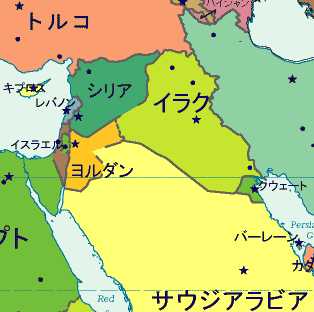
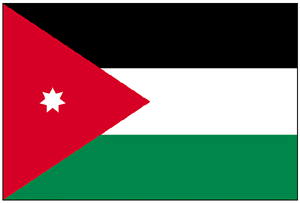
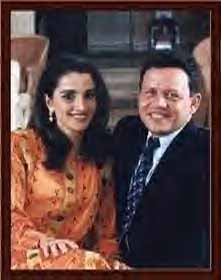
写真を見ると、王妃はやり手の妻であり、皇太子として、何不自由なく育った皇太子をうまく操縦するやり手の妻である印象を受ける。
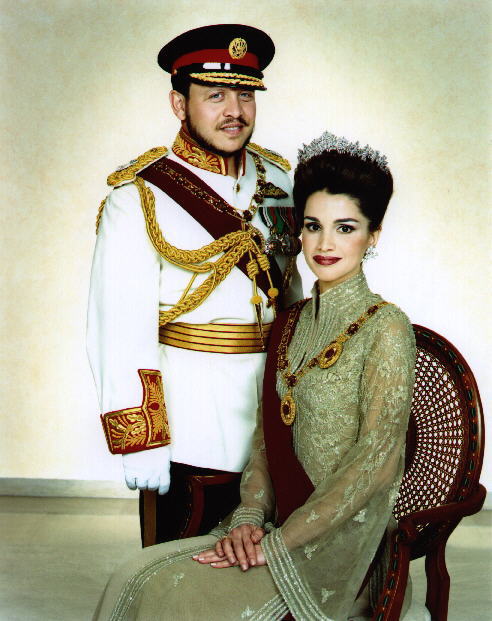
アブドッラー・ビン・アル・フセイン国王陛下 His Majesty Abdullah II bin Al Hussein King of the Hashemite Kingdom of Jordan
平成14年7月現在 1.氏 名 アブドッラー・ビン・アル・フセイン (Abdullah II bin Al Hussein) 2.生年月日 1962年1月30日 生 3.出生地 アンマン 4.学 歴 1980〜81年 英王立陸軍士官学校 1983年〜 英 オックスフォード大学聴講生(国際政治) 1987〜88年 米 ジョージタウン大学大学院修士課程(国際関係論) 1990年 英 指揮幕僚学校 5.職 歴 1962〜65年 皇太子 1981年 ジョルダン陸軍少尉任官 1984年 陸軍中尉 1985〜86年 陸軍大尉、第91師団戦車大隊長 1986〜87年 空軍対戦車ヘリコプター隊戦術教官 1989年 陸軍少佐、第17師団戦車大隊長 1992年 第40旅団装甲大隊長 1993年 陸軍大佐 1994年6月 陸軍准将 1994年7月 ジョルダン特殊部隊司令官 1998年 陸軍少将 1999年1月 皇太子に叙任 1999年2月 国王に即位 6.言 語 アラビア語、英語 7.宗 教 イスラム教徒 8.訪日歴 4回(1999年12月には国賓で訪日) 9.主要叙勲 大勲位菊花大綬章及び頚飾(1999年。国賓訪日の際の相互儀礼叙勲) 10.家 族 ラーニア王妃との間に一男二女。 11.趣 味 スキューバ・ダイビング、カーレース等
His Majesty King Abdullah bin Al-Hussein His Majesty King Abdullah II is the 43rd generation direct descendant of the Prophet Muhammad. King Abdullah assumed his constitutional powers as King of the Hashemite Kingdom of Jordan on February 7,1999, the day his father, the late King Hussein, passed away. Born in Amman on January 30, 1962, His Majesty is the eldest son of the late King Hussein and has four brothers and six sisters. King Abdullah began his education at the Islamic Educational College and received his secondary education at St. Edmund’s School in Surrey, England, Eaglebrook School in Massachusetts, then at Deerfield Academy in the United States of America. In 1980, King Abdullah entered the Royal Military Academy Sandhurst in the United Kingdom, where he received his military education. King Abdullah attended Oxford University in 1984, undergoing a one-year Special Studies course in International Politics and World Affairs. Upon returning home, His Majesty continued his military path, gaining experience and working his way to the rank of Captain and the Commander of a Tank Company in the 91st Armored Brigade. From 1986-1987, also as Captain, His Majesty was attached to the Royal Jordanian Air Force’s Helicopter Anti-Tank Wing as a Tactics Instructor, where he received qualification as a Cobra Attack Helicopter Pilot. In 1987, King Abdullah attended the School of Foreign Service at Georgetown University in Washington, D.C., and was in residence as a Mid-Career Fellow. He undertook Advanced Study and Research in International Affairs under the auspices of the Master of Science in Foreign Service Program. Upon returning home, His Majesty was assigned to the 17th Tank Battalion, 2nd Royal Guards Brigade and in the summer of 1989, he became Battalion 2nd-in-Command, with the rank of Major. In 1991, King Abdullah was the Armor Representative in the Office of the Inspector General. He was promoted to Lt. Colonel at the end of the year and assumed command of the 2nd Armored Car Regiment in the 40th Brigade. Upon handing over the battalion in January 1993, King Abdullah was promoted to full Colonel and assigned as deputy commander of the Jordanian Special Forces. In June 1994 he was promoted to the rank of Brigadier General, and assumed command of the Royal Jordanian Special Forces, after having served as Deputy Commander for six months. His Majesty was appointed Commander of the Special Operations Command on October 1997, and in May 1998, he was promoted to the rank of Major General. In addition to his career as an army officer, King Abdullah has served his country many times in the official capacity of Regent in the absence of His Majesty King Hussein, and he regularly traveled with the late King Hussein. Before his accession to the throne, King Abdullah represented Jordan and his late father on visits to many countries throughout the world, and developed close relationships with leaders and officials of a number of Arab countries during the course of his career. King Abdullah is committed to building on the legacy left by the late King Hussein to further Jordan’s democratic institutionalization and political pluralism, while working for a just and comprehensive peace. Following in his late father’s footsteps, King Abdullah has placed great emphasis on improving Jordan’s economy and streamlining the government which will lay the foundations to allow Jordan to enter the next century with confidence. King Abdullah married Queen Rania on June 10, 1993. Their Majesties have one son, Prince al-Hussein, born June 28, 1994, and one daughter, Princess Iman, born September 27, 1996. King Abdullah is a qualified frogman, pilot and a free-fall parachutist. His other interests include car racing (he is a former Jordanian National Rally Racing Champion), water sports, scuba diving and collecting ancient weapons and armaments. His Majesty King Abdullah bin Al-Hussein King of Jordan His Majesty King Abdullah bin Al-Hussein is the 43rd generation direct descendant of the Prophet Muhammad. King Abdullah assumed his constitutional powers as King of the Hashemite Kingdom of Jordan on February 7, 1999, the day his father, the late King Hussein, passed away. King Abdullah is committed to building on the legacy left by the late King Hussein to further Jordan's democratic institutionalization and political pluralism, while working for a just and comprehensive peace in a climate of openness and tolerance. Born in Amman on January 30, 1962, His Majesty is the eldest son of the late King Hussein and has four brothers and six sisters. King Abdullah began his education at the Islamic Educational College and received his secondary education at St. Edmund's School in Surrey, England, Eaglebrook School in Massachusetts, then at Deerfield Academy in the United States of America. In 1980, King Abdullah entered the Royal Military Academy Sandhurst in the United Kingdom, where he received his military education. King Abdullah attended Oxford University in 1984, undergoing a one year Special Studies course in International Politics and World Affairs. Upon returning home, His Majesty continued his military path, gaining experience and working his way to the rank of Captain and the Commander of a Tank Company in the 91st Armored Brigade. From 1986 -1987, also as Captain, his Majesty was attached to the Royal Jordanian Air Force's Helicopter Anti-Tank Wing as a Tactics Instructor, where he received qualification as a Cobra Attack Helicopter Pilot. In 1987, King Abdullah attended the School of Foreign Service at Georgetown University in Washington, D.C., and was in residence as a Mid-Career Fellow. He undertook Advanced Study and Research in International Affairs under the auspices of the Master of Science in Foreign Service Program. Upon returning home, His Majesty was assigned to the 17th Tank Battalion, 2nd Royal Guards Brigade and in the summer of 1989, he became Battalion 2nd-in-Command, with the rank of Major. In 1991, King Abdullah was the Armor Representative in the Office of the Inspector General. He was promoted to Lt. Colonel at the end of the year and assumed command of the 2nd Armored Car Regiment in the 10th Brigade. Upon handing over the battalion in January 1993, King Abdullah was promoted to full Colonel and assigned as Deputy Commander of the Jordanian Special Forces. In June 1994, he was promoted to the rank of Brigadier General, and assumed command of the Royal Jordanian Special Forces, after having served as Deputy Commander for six months. His Majesty was appointed commander of the Special Operations Command on October 1997, and in May 1998, he was promoted to the rank of Major General. In addition to his career as an army officer, King Abdullah has served his country many times in the official capacity of Regent in the absence of His Majesty King Hussein, and he regularly traveled with the late King Hussein. Before his accession to the throne, King Abdullah represented Jordan and his late father on visits to many countries throughout the world, and developed close relationships with leaders and officials of a number of Arab countries during the course of his career. King Abdullah married Queen Rania on June 10, 1993. Their Majesties have one son, Prince al-Hussein, born June 28, 1994, and one daughter, Princess Iman, born September 27, 1996. King Abdullah is a qualified frogman, pilot and a free-fall parachutist. His other interests are car racing (he is a former Jordanian National Rally Racing Champion), water sports, scuba diving and collecting ancient weapons and armaments. Source: Website of the Embassy of the Hashemite Kingdom of Jordan. Washington, D.C. His Majesty King Abdullah II bin al-Hussein of the Hashemite Kingdom of Jordan addresses the 91st International Labour Conference
--------------------------------------------------------------------------------
Thursday 12 June 2003 (ILO/03/32) GENEVA (ILO News) - Declaring that "work and working people are at the heart of global prosperity," King Abdullah II of Jordan today told the 91st International Labour conference that the "war on want" must be won in order to "heal the divisions and despair that feed global violence". "Young people, who desperately need opportunities and hope, see themselves and their societies held back by poverty, health crises, illiteracy and more", King Abdullah said. "Is it any surprise that these communities can become recruiting grounds for extremist ideologies?" In an address to some 2,500 delegates at the Conference, King Abdullah II said overcoming want "requires sustainable socio-economic development, development that enables all people to live in dignity. Such development is an important tool in the battle against extremism - as is a just resolution of the Arab-Israeli conflict and the Question of Palestine". Insisting on "the urgent need to rebuild and stabilize the Middle East region", which is currently at "a critical crossroads", King Abdullah said he believed "now is the time to work together, to put our full force behind the process that will lead to the hand-over of Iraq to a credible Iraqi government, representing all Iraqis". Referring to the recent summit in Aqaba aimed at setting out a new road to peace, King Abdullah indicated that "the process is beginning. But the friends of peace must now stay the course". In his welcoming remarks, the ILO Director-General Juan Somavia said the road to peace in the Middle East was facing renewed difficulties, but "as the leadership of our guest and his great nation has proved through the years we cannot give up". Quoting from a statement by King Abdullah made during the Aqaba summit, he said "King Abdullah's words in Aqaba provide inspiration: 'The biggest casualty in the Middle East, he said, is a loss of hope. We have this opportunity", he continued, "and an obligation to reinstate faith in the process and to reinvigorate hopes for a better tomorrow'". King Abdullah said Jordan had introduced reforms to enhance the training and productivity of its workforce, without which the economy could not grow. The King also stated that he firmly believed that "progress on the national level demands progress on the global level as well". "Achieving such progress will require a true partnership between developed and developing countries - a partnership based on our common interests, our interdependence, and our shared responsibilities", the King said. "Only such a partnership can deliver the global justice that is required ... and encourage developing countries to embark upon needed political, economic and social reforms." Stating that such a new global partnership required "hard choices", King Abdullah added "dialogue must be coupled with action, from both sides. Across the board, we need improved market access, the removal of trade barriers and predictable trade policies. Developed countries must increase the level of direct assistance, encourage foreign direct investment and technology transfer and reduce the debt burden. Developing countries must commit to sound economic policies, coupled with the right safety nets, good governance and the rule of law". "In my region, in every region, we must cooperate, and quickly, to address key issues - political freedoms, improving the role of women and bridging the knowledge gap", the King said. King Abdullah bin al-Hussein His Majesty King Abdullah bin Al-Hussein and Her Majesty Queen Rania Al-Abdullah (1962 - )
--------------------------------------------------------------------------------
His Majesty King Abdullah bin al-Hussein is the 43rd generation direct descendant of the Prophet Muhammed. King Abdullah assumed his constitutional powers as King of the Hashemite Kingdom of Jordan on February 7, 1999, the day his father, the late King Hussein, passed away. King Abdullah is committed to building on the legacy left by the late King Hussein to further Jordan's democratic institutionalization and political pluralism, while working for a just and comprehensive peace in a climate of openness and tolerance. Born in Amman on January 30, 1962, His Majesty is the eldest son of the late King Hussein and has four brothers and six sisters. King Abdullah began his education at the Islamic Educational College and received his secondary education at St. Edmund's School in Surrey, England, Eaglebrook School in Massachusetts, then at Deerfield Academy in the United States of America. In 1980, King Abdullah entered the Royal Military Academy Sandhurst in the United Kingdom, where he received his military education. King Abdullah attended Oxford University in 1984, undergoing a one year Special Studies course in International Politics and World Affairs. Upon returning home, His Majesty continued his military path, gaining experience and working his way to the rank of Captain and the Commander of a Tank Company in the 91st Armored Brigade. From 1986 -1987, also as Captain, his Majesty was attached to the Royal Jordanian Air Force's Helicopter Anti-Tank Wing as a Tactics Instructor, where he received qualification as a Cobra Attack Helicopter Pilot. In 1987, King Abdullah attended the School of Foreign Service at Georgetown University in Washington, D.C., and was in residence as a Mid-Career Fellow. He undertook Advanced Study and Research in International Affairs under the auspices of the Master of Science in Foreign Service Program. Upon returning home, His Majesty was assigned to the 17th Tank Battalion, 2nd Royal Guards Brigade and in the summer of 1989, he became Battalion 2nd-in-Command, with the rank of Major. In 1991, King Abdullah was the Armor Representative in the Office of the Inspector General. He was promoted to Lt. Colonel at the end of the year and assumed command of the 2nd Armored Car Regiment in the 10th Brigade. Upon handing over the battalion in January 1993, King Abdullah was promoted to full Colonel and assigned as Deputy Commander of the Jordanian Special Forces. In June 1994, he was promoted to the rank of Brigadier General, and assumed command of the Royal Jordanian Special Forces, after having served as Deputy Commander for six months. His Majesty was appointed commander of the Special Operations Command on October 1997, and in May 1998, he was promoted to the rank of Major General. In addition to his career as an army officer, King Abdullah has served his country many times in the official capacity of Regent in the absence of His Majesty King Hussein, and he regularly traveled with the late King Hussein. Before his accession to the throne, King Abdullah represented Jordan and his late father on visits to many countries throughout the world, and developed close relationships with leaders and officials of a number of Arab countries during the course of his career. King Abdullah married Queen Rania on June 10, 1993. Their Majesties have one son, Prince al-Hussein, born June 28, 1994, and one daughter, Princess Iman, born September 27, 1996. King Abdullah is a qualified frogman, pilot and a free-fall parachutist. His other interests are car racing (he is a former Jordanian National Rally Racing Champion), water sports, scuba diving and collecting ancient weapons and armaments.
--------------------------------------------------------------------------------
Source: Embassy of the Hashemite Kingdom of Jordan - Washington, D.C. His Majesty King Abdullah II King of The Hashemite Kingdom of Jordan His Majesty King Abdullah II bin Al Hussein is the 43rd generation direct descendant of the Prophet Muhammad (Peace Be Upon Him). He assumed his constitutional powers as Monarch of the Hashemite Kingdom of Jordan on February 7th, 1999, the day his father, the late King Hussein, passed away. Born in Amman on January 30th, 1962, King Abdullah II is the eldest son of His Majesty the late King Hussein and Her Royal Highness Princess Muna Al Hussein. He began his primary education at the Islamic Educational College in Amman, and later attended St. Edmund's School in Surrey, England. For his secondary education, he attended Eaglebrook School and Deerfield Academy in the United States of America. King Abdullah II joined the Royal Military Academy Sandhurst in the United Kingdom in 1980, and was commissioned as Second Lieutenant in 1981. He was later appointed Reconnaissance Troop Leader in the 13th/18th Battalion of the Royal Hussars (British Army) in (West) Germany and England. In 1982, King Abdullah II attended Oxford University where he completed a one-year Special Studies course in Middle Eastern Affairs. Upon returning home, King Abdullah II joined the Jordanian Armed Forces and served as Platoon Commander and Company Second-in-Command in the 40th Armored Brigade. In 1985, he attended the Armored Officers Advanced Course at Fort Knox, Kentucky, USA. A year later, he became Commander of a Tank Company in the 91st Armored Brigade of the Jordanian Armed Forces holding the rank of Captain. He also served with the Royal Jordanian Airforce Anti-Tank Wing where he received his wings as well as his qualifications as a Cobra Attack Pilot. In 1987, King Abdullah II attended the School of Foreign Service at Georgetown University in Washington, D.C. as a Mid-Career Fellow. He completed an Advanced Study and Research program in International Affairs, part of the ‘Master of Science in Foreign Service' program. King Abdullah II, thereafter, resumed his military career where he held various positions, among them Commander of the Royal Jordanian Special Forces and Special Operations Commander. From January 1989 until October 1989 King Abdullah II was the 2nd Company Commander in the 17th Tank Battalion, and from October 1989 until January 1991 he was 2nd in Command of the 17th Tank Battalion, during which time, in 1990, he attended the Royal Staff College in Camberley in the United Kingdom. He was then promoted to the rank of Major. From January 1991 until January 1992 he was Armored Corps Representative in the Office of the Inspector General of the Jordanian Armed Forces. King Abdullah became Battalion Commander of the Second Armored Cavalry Regiment in January 1992. In 1993, he was in the 40th Brigade with the rank of Colonel, and was made Deputy Commander of the Jordanian Special Forces. In 1994, he was made Commander of Special Forces with the rank of Brigadier and in 1996 he reorganized the Special Forces and other Elite Units into the Special Operations Command. King Abdullah was promoted to Major-General in 1998, and in June / July of the same year attended a defense resources management course in Monterrey Naval Post Graduate School. In addition to his career as an army officer, King Abdullah II served Jordan many times in the official capacity of Regent in the absence of the late King Hussein, and regularly traveled on official missions. He was proclaimed Crown Prince on the 24th of January 1999 by a Royal Decree. He had also assumed the position of Crown Prince at birth by a Royal Decree until April 1st, 1965. Since his ascension to the throne, King Abdullah II has continued his late father's commitment to creating a strong and positive moderating role for Jordan within the Arab region and the world, and has worked towards the establishment of a just and lasting comprehensive solution to the Arab-Israeli conflict. King Abdullah II is committed to building on the late King's legacy to further institutionalize democratic and political pluralism in Jordan. He has exerted extensive effort to insuring sustainable levels of economic growth and social development aimed at improving the standard of living of all Jordanians. He is also working towards modernizing Jordan's information technology and educational systems. Under King Abdullah's reign, Jordan was admitted to the World Trade Organization, and ratified agreements for the establishment of a Free Trade Area with the United States of America, the European Union, the European Free Trade Association countries, and sixteen Arab countries. King Abdullah II has also been involved in the drive for national administrative reform, as well as governmental transparency and accountability. He has been working on the advancement of civil liberties making Jordan one of the most progressive countries in the Middle East. Also, he has been involved in enacting the necessary legislations that guarantee women a full role in the Kingdom's socio-economic and political life. King Abdullah II married Queen Rania on June 10th, 1993. The Royal Couple have one son, Prince Hussein, born on June 28th, 1994, and two daughters, Princess Iman, born on September 27th, 1996, and Princess Salma, born on September 26th, 2000. The King has four brothers and six sisters. King Abdullah II holds a number of decorations from various countries. He is a qualified frogman, pilot and a free-fall parachutist. His other interests include automobile racing, water sports, scuba diving and collecting ancient weapons and armaments.
要人来日日程(平成11年) アブドッラー・ヨルダン国王訪日に際しての 日本・ヨルダン共同プレス・ステイトメント (1999年11月30日−12月4日) 平成11年12月4日 東京 1.ヨルダン・ハシミテ王国国王アブドッラー・ビン・アル・フセイン陛下及びラーニア・アル・アブドッラー王妃陛下は、随員と共に1999年11月30日から12月4日まで国賓として日本国を訪問された。今次訪問は、1954年の国交樹立以来40年以上にわたる両国間及び皇室・王室間の友好親善関係を、21世紀に向けて一段と深めるものとなった。 2.日本訪問中、アブドッラー国王陛下及びラーニア王妃陛下は、迎賓館において歓迎式典に臨まれた後、皇居において天皇・皇后両陛下と御会見になり、天皇皇后両陛下主催宮中晩餐に出席された。アブドッラー国王は、大勲位菊花大綬章並びに頸飾を、ラーニア王妃陛下は、勲一等宝冠章を受けられた。これに対し、アブドッラー国王は、天皇陛下にアル・フセイン・ビン・アリ勲章を贈られた。アブドッラー国王陛下及びラーニア王妃陛下は、天皇・皇后両陛下に敬意を表して、答礼晩餐を主催された。アブドッラー国王陛下及びラーニア王妃陛下は、天皇・皇后両陛下からの暖かいご歓迎に謝意を表し、ヨルダン訪問の招待を行った。 3.アブドッラー国王陛下及び小渕総理大臣は会談を行い、二国間関係や中東和平問題など両国が互いに関心を有する諸問題について意見交換を行った。アブドッラー国王陛下は、小渕総理に対し、ヨルダン訪問の招待を行った。アブドッラー国王陛下及び王妃陛下は、小渕総理夫妻主催晩餐に出席された。 アブドッラー国王及びラーニア王妃両陛下は、新設された日本・ヨルダン友好議員連盟会長及び会員の表敬訪問も受けられた。 4.アブドッラー国王は、日本貿易振興会(JETRO)が主催する「ヨルダン投資・観光フォーラム」の冒頭で挨拶され、二国間の貿易及び投資の拡充、観光の促進に向けて両国が協力していくことの重要性を指摘された。アブドッラー国王は、学習院にて講演を行い、日本の若者との交流を深められた。 5.アブドッラー国王と小渕総理は、会談において、ヨルダンが地政学的に占める位置に鑑み、「安定し繁栄したヨルダン」が中東地域全体の安定化に直結していることに関し、共通の認識を示した。小渕総理大臣は、1994年のヨルダン・イスラエル平和条約締結を始めとする、中東和平プロセスの推進に尽力した故フセイン国王陛下の勇気と前国王の路線を継承されたアブドッラー国王の中東和平に対する貢献を賞賛した。 6.両首脳は、マドリード会議の諸原則及び関連国連安保理決議242、338及び425、特に「領土と平和の交換」原則に基づき、公正、永続的かつ包括的な和平が達成されるべきである旨改めて確認した。両首脳は、イスラエル、パレスチナの両当事者に対し、シャルム・エル=シェイク合意の期日どおりの誠実な履行及び最終的地位交渉の加速的実施を呼びかけた。また、特に入植地問題やエルサレム問題との関連で、その最終的地位交渉の結果に予断を与えかねないいかなる一方的措置をも控えることを強調した。両国政府は、中東の安定及び安全保障を維持するために積極的な役割を果たしていくことにコミットした。アブドッラー国王は、本年10月に東京でパレスチナ支援調整会議を主催したことを含む日本政府のパレスチナ支援を評価した。 7.両国政府は、パレスチナ難民問題の解決が、包括的中東和平の実現にとり最重要な問題の一つであり、国際社会が、西岸・ガザはもちろんのこと、ヨルダン、シリア、レバノンにおけるパレスチナ難民のニーズにできるだけ対応していくべきであることを認識した。また両国政府は、国連パレスチナ難民救済事業機関(UNRWA)の活動を引き続き支援していくことの重要性を再確認した。 8.両国政府は、中東地域における包括的和平実施のため、シリア、レバノン・トラックにおける交渉の早期再開を当事国に呼びかけた。アブドッラー国王は、4項目提案に見られる南レバノンに関する日本のイニシアチブを評価した。両国政府は、多国間協議を活性化させるための適切な環境作りの重要性、及び環境、水資源、経済開発などの分野における作業部会での日本の努力とイニシアチブを強調した。両国政府は、ヨルダンにおいて、パレスチナ人を含む関係者からの参加者に対して行われる環境法整備にかかる研修を、日本・ヨルダン間の新たな協力形態であるとして評価した。 9.両国は、イラク国民の窮状に対する懸念と同情を再確認し、右窮状を終らせるための解決策を探求する継続的な国際的努力を呼びかけた。両国は、イラクがイラクの状況に関する関連国連安保理決議を遵守することを呼びかけた。両国はまた、イラクの主権と領土的統一の維持の重要性を強調した。 10.両国政府は、国連を21世紀の国際社会が抱える課題に有効に対応できる機関とするために改革していくことが必要であるとの認識を共有し、常任・非常任双方の議席の拡大を伴う安保理改革を早期に行うことが重要であることを強調した。この関連で、ヨルダン側は、日本の安保理常任理事国入りに対する支持を再確認した。 11.両国政府は、如何なる形態のものであれ、また、起源や理由の如何にかかわらず、テロに対し断固たる立場をとる必要性を再確認した。 12.両国政府は、日本・ヨルダン両国民間の相互理解を促進するために、人物交流及び文化交流を進めることの重要性を確認し、今後両国政府間で協力のあり方を協議することに決定した。特に、女性同士の交流を通じて生まれる国際的な連帯は、二国間の友好関係を更に強化するものである。両国間で高い評価を受けている「日本・ヨルダン女性交流」プログラムを今後とも継続していくと共に、次回はパレスチナも加えて実施することを確認した。 13.小渕総理は、ヨルダンのWTOへの加盟の準備が整ったことを、ヨルダン経済の持続的発展の第一歩として歓迎した。 14.慢性的な国際収支赤字及び債務問題に直面しているヨルダンの経済的安定を図ることの必要性を踏まえ、またヨルダン政府がIMF等と協議の上、経済改革を行っていることを評価しつつ、小渕総理は、ヨルダンの債務負担の軽減を図るため、本年より2001年までの3年間で総額約4億ドルに上る包括的な「経済支援パッケージ」を発表した。 アブドッラー国王は、これまでの日本の対ヨルダン経済協力に深い感謝の意を表明すると共に今次「経済支援パッケージ」に高い評価と心からの感謝の意を表した。 「経済支援パッケージ」の主要な内容は以下のとおり。 (1)債務救済を含む国際収支支援 日本は、円借款債権にかかる繰り延べ金利の3.9%から2.2%への引き下げを含む「第5次債務繰延(対象債権総額約150億円)」を行うこととし、2日、青木幹雄・日本国内閣官房長官(外務大臣臨時代理)とリマ・ハラフ・フネイディ・ヨルダン副首相兼計画大臣との間で交換公文(E/N)の署名を行った。 また、ヨルダン政府による経済構造改善努力を支えるため「ノンプロジェクト無償資金協力」を供与しているが、今後も必要に応じ更なる供与を検討する。 (2)自立的経済発展支援 日本は、ヨルダン産業の競争力の自立的発展に必要とされる産業政策の企画・立案に対する技術支援を「重要政策中枢支援」として引き続き実施する。更に、日本は、この政策支援の実効性を保つために、「企業経営能力強化」に係る開発調査を実施するとともに、ノンプロジェクト無償資金協力の見返り資金をこれらの政策実施のための資金として担保する。 また、外貨獲得の貴重な手段の一つとなっている観光産業の振興の重要性に鑑み、「観光セクター開発計画」に対する円借款(約7,000万ドル)に関しても、2日、国際協力銀行とヨルダン政府との間で借款協定(L/A)署名を行った。 (3)社会開発への支援 一般国民の生活向上を経済開発と歩調を合わせて進めるために、日本は、社会開発への支援を引き続き実施していく。このため、また、中東和平を支援するために、ヨルダン・イスラエル平和条約の結果、利用可能となった水をアンマン都市圏に効率的に供給することを目的とする無償資金協力「第二次アンマン都市圏上水道施設改善計画」の実施を着実に図っていく。また、西岸地域との主要な通路であるキングフセイン橋の架け替えを行うべく準備を進めている。 また、本年の大規模な干魃による農作物の被害に対応するため、日本は、世界食糧計画(WFP)を通じて食糧支援(約57万ドル)を実施することを決定した。 15.両国は、政治、経済、社会、文化及び経済協力を含む二国間関係全般について議論するため、両国の様々な分野を代表する者の参加により、緊密な意見交換を継続的に行うこととし、そのための「日本・ヨルダン協議フォーラム」を設置し、今後定期的に開催することに合意した。JETRO主催の「投資観光フォーラム」は、本「協議フォーラム」を創設する努力の始まりである。